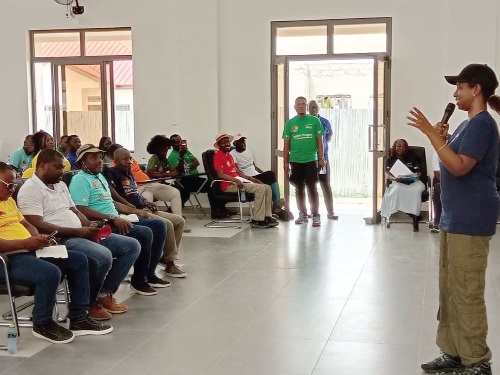
Youth advised to embrace agribusiness for self-sustenance
The Country Director for Mastercard Foundation, Rica Rwigamba, has urged young people to embrace agriculture as a means of securing sustainable livelihoods.
She recognised the untapped potential of the agricultural sector and highlighted the many opportunities available, and urged young individuals to consider farming as a viable career choice.
Ms Rwigamba said this in an interview with journalists last Wednesday at Kasunya in the Shai Osudoku District in the Greater Accra Region during an exhibition at the Kasunya Economic Enclave Project (EEP).
The exhibition was an initiative of a joint team from the foundation and Agri-Impact Limited organised as part of the Harnessing Agricultural Productivity and Prosperity for Youth (HAPPY) Programme.
The HAPPY Programme targets youth aged 15-35, with 70 per cent women’s participation, with the aim to boost productivity in rice, soya, tomato and poultry value chains to reduce import dependency.
The four-year intervention being implemented by eight organisations, include Newage Agric Solutions, National Service Scheme (NSS), Ghana CARES (MiDA), Ghana Enterprises Agency (GEA), Ministry of Food and Agriculture (MOFA), TechnoServe, Catholic Relief Services (CRS) and Jobberman.
Youth empowerment
After visiting some of the stands at the exhibition, Ms Rwigamba expressed her excitement, praising the partners for focusing on empowering the youth.
She said the Foundation was committed to ensuring that over three million Ghanaian youth, especially women, had access to dignified jobs by 2030 and stressed the need for the youth to view agribusiness as one of the ventures that lead to wealth creation.
Success
The Chief Executive Officer of Agri-Impact Limited, Daniel Fahene Acquaye said the project commenced on December 2023, and as of October this year, close to 100,000 young people had secured dignified and fulfilling jobs within the poultry, rice, soybean and tomato value chains.
Mr Acquaye explained that the four value chains were selected based on the fact that Ghana imports a lot of these produce, stressing that by producing these food items locally, Ghana could reduce its import bill, create jobs and enhance livelihoods locally.
“Through this intervention, the project intends to produce 189,00 metric tonnes of food to generate close to $ 200 million worth of income for young people annually and by so doing reduce food import by 10 per cent per annum,” he said.
Partnerships
The CEO of the Millennium Development Authority (MiDA), Michael Asare Bediako, in a speech read on his behalf by Milana Agyeman, Chief Accountant at MiDA, said the Kasumya Economic Enclaves Project, the first of several of model enclaves planned under the Ghana COVID-19 Alleviation and Revitalisation of Enterprises Support (Ghana CARES) Obaatanpa programme, exemplified what could be achieved through collaboration, adding that the HAPPY Programme served as a launch pad for economic empowerment to equip young people with resources, training and mentorship.
Impact
The founder and Chief Farmer at Agro Kings, an anchor farmer under the project, Nana Owusu-Achau, said prior to the intervention, Agro Kings was working with 600 smallholder farmers in three districts.
However, in the last 12 months, he said, they had moved from 600 to 7,000 smallholder farmers in 15 districts. In terms of the youth working on the programme, the figure has risen from 27 young farmers in 2023 to 300 in 2024 under the HAPPY programme.
Also, 12 persons with disability have been offered employment opportunities, while some young females have been empowered with the skills of operating tractors and other heavy machinery
Writer’s email: Benjamin.glover@graphic.com.gh
